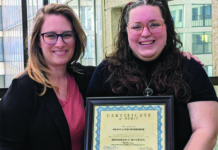If there was a Venn diagram for living on and off campus, the similarities section would look mostly empty, much like your bank account. The cost of living for Sloan Tucker, a 20-year-old sophomore, is approximately 350 dollars a month, not including utilities or groceries. She lives with three other students, a few blocks south of campus on Hill Avenue. Tucker compares her experience of off campus living as a “glorified hobo,” finding it hard to keep a clean wardrobe and a satisfying diet, often doing laundry in the sink and scavenging for food.
Living off campus comes with its own terms. It is by far the less expensive housing option, but it’s not as easy as it looks. There are little things that off campus students don’t take for granted anymore, such as the staff doing your dishes and restocking the toilet paper in the bathroom.
However, those no longer restricted by Reslife have the luxury of choosing roommates, having dogs, and creating their own house rules. There is no R.A on duty to warn you of your music being too loud. There is no anonymous vomit in communal areas on Sunday mornings. But, there is also no food prepared for you when the munchies hit.
“You pay for your privacy, a price worth walking a few blocks to class for,” Tucker said. Living outside of campus boundaries force you to fend for yourself.
Unlike fully off campus residents, R.A Celeste Martinez lives in CMU’s newly established Orchard Apartments, an apartment-styled building that allows students the sense of off campus living, while still being associated with Colorado Mesa’s Reslife. The fully furnished kitchen provides an opportunity for students to cook for themselves. However, this requires weekly trips to the grocery store. The standard college life shopping list of ramen, milk and cereal adds up quickly.
Campus life offers an abundance of activities for everyone, although both Martinez and Tucker agree that it is easier to stay involved while living on the University’s grounds. There is never a dull moment in the dorms.
“It is definitely a real bonus if you score a roommate that you make dinner together, have movie nights and discuss boy problems,” said Martinez. “Sharing all your space and time with your colleagues makes for a never ending summer camp lifestyle: cafeteria food, communal bathrooms and quiet hours,” said Martinez.
Inevitably, there are pros and cons to every living situation and things that will have to be sacrificed. The real questions to ask when deciding where to live is what to prioritize: saving money or making memories? Being in the scene of things or being the host? Having a scheduled meal plan or eating when you have food?
Regardless of living on or off campus, the CMU students all have different challenges through college. CMU and Grand Junction, in general, has many off living campus options. Both the Reslife and off campus houses for students have their pros and cons, and every student has different preferences when it comes to living.





